- Home
- Rodman Philbrick
Lobster Boy Page 9
Lobster Boy Read online
Page 9
Air! Must have air!
The surface is shimmering above me. Looks like a silver mirror made of liquid. Beautiful. Air bubbles coming out of my mouth rise up and melt into the shimmering silver mirror. Never seen nothing so pretty.
MUST HAVE AIR!
Who’s making all the noise? Shouting while you’re underwater? That’s really stupid. Can’t shout underwater, you fool.
Relax. Quit fighting. Open your mouth and inhale. You know you want to. You have to inhale something, right? Maybe your lungs can take air out of the water like a fish. Mom always said you were part fish, right? So breathe underwater and prove it.
I open my mouth and try to inhale but nothing comes in. I can’t get my throat unstuck; it’s like there’s a ring of ice around my neck.
SKIFF BEAMAN, DON’T YOU DARE BREATHE WATER!
Can’t help it, Mom. Got to breathe something. Got to. Got to. Got to.
Don’t give up! Listen to me! Rule Number Three! Never give up! The surface is right above your head! Kick! Kick! Kick!
Too far away. Can’t make it. So tired.
Try, Skiffy, try!
I kick and kick until there’s nothing left in my legs. I want to laugh because it’s so funny, getting drowned by a fish. Funniest thing in the world. But my throat is closed and the ice has gone into my lungs and laughing hurts too much. Good joke, though. Really, really funny.
Rule Number Three: Never give up. Don’t ever give up!
Blackness shimmers down from above. I’m inside the warm dark.
Time to sleep.
Coughing hurts so bad, it wakes me up. Is this drowning? Water in my mouth, making me choke, but there’s air, too. Real air. I’m at the surface, bobbing up and down. Voice in my head made me wake up, but I can’t remember what it said or how I got here.
Choking and coughing hurts worse than drowning. Plus I can’t see because my eyes are drenched in salt water.
KLANG!
Back of my head whacks into something hollow. Turn around, flailing my arms, find the keg bobbing next to me. Grab hold. Pull myself up, so my shoulders are clear of the water. Hug that keg with all my might while I get my wind back.
What happened? Can’t put it straight in my head. Okay. Hand tangled in the line, I remember that. Getting yanked into the water. Tried to get loose and couldn’t. Thought about inhaling water but couldn’t do that, either.
So why am I alive?
When my eyes finally clear up, I see why. There it is, circling inside the wall of white fog. The giant bluefin back on the surface, swimming in a big circle around me and the keg.
Does it know it almost killed me and then saved my life?
I want to shout out to the fish, ask it where my boat is, but my throat hurts too much.
Figure my little skiff can’t be too far away. Somewhere inside the wall of fog. Got to find that boat before too long or the cold water will kill me. Already I’m so numb, I can’t hardly feel a thing from the neck down.
Cold water is sucking the heat out of me. And they say if your blood gets too cold, you die.
Hang around the town wharf, you hear about it all the time. How falling out of a boat can kill a man if he stays in cold water for long. They say in the wintertime, with water close to freezing, you ain’t got but ten or fifteen minutes before your heart quits beating. Summer water takes longer. Figure maybe an hour or two.
Part of me wants to let go of the keg and swim around looking for the skiff before I’m too weak to move my arms. But the keg is helping me float, letting me get my strength back, and if I let go I may never find it again. Then where’d I be?
If I was wearing my life jacket it might be different. Keeping hold of the keg wouldn’t be so important. But like a darn fool I left my life jacket in the bottom of the boat, under the seat. Life jacket don’t do much good if you don’t wear it. My dad must have told me that a thousand times, but I guess it didn’t take.
Too late to worry about that now. Mistake’s already been made. Worry about keeping your head above water. Worry about holding on to the keg. Worry about finding the skiff. Can’t be far, can it? No wind to speak of. Nothing to move it but the tide and current, and that same tide and current is moving me and the keg in the same direction.
Can’t be far. Look around, maybe you’ll see it. The fog may lift again. See that little boat, you swim for it with all your might. Meantime, ride the keg and hope for the best.
Shivering cold reminds me of the day Mom died. She’d been real sick for a long time, and we all knew what was coming, so I should have been ready, but it don’t work like that. Knowing a thing is bound to happen don’t make it easier. Thing is, you keep hoping for a miracle right up to the end and then when it don’t it’s like the floor disappears and you’re falling but you never hit bottom.
When it happened, all I could think to do was run. First I ran in circles around her room. Then I ran around the house kicking at the stupid snow. Then I ran across the road and into the woods and climbed up a tree and lay there hugging the icy branch while the ambulance came and went. I watched Captain Keelson and his wife drive up and go inside and then Dad came out with them and Captain Keelson shouted my name and asked me to come home, please, and be with my father, but I kept hugging the branch and hoping I’d wake up from a bad dream and Mom would be okay except I knew it wasn’t a dream and I’d never ever see her again or hear her voice, ever ever ever, and that’s when she said, Skiffy, go to your father, her voice in my head as clear as day, and I knew that’s what she’d want me to do and I did it, I came down from the tree and went back to the house and told Dad not to worry, everything would be okay because Mom said so, and he give me a look so sad, it hurt to breathe and then he went and lay down on the TV couch and didn’t say nothing for a long time.
I guess Dad can’t hear Mom’s voice like I can, or if he does he won’t listen.
Anyhow, I’m riding that keg and thinking about my mom and my dad and home and the Mary Rose and that’s when the skiff comes out of the fog, bobbing up and down like it’s trying to say “hello”.
First I think my eyes are fooling, but there it is, big as life, looking like it missed me.
I keep hold of the keg for a minute in case the skiff decides to disappear again. Maybe it’s a trick to make me let go of the keg. But the skiff keeps drifting closer and closer and when I can almost reach out and touch it I let go the keg and kick like mad and pull myself into the boat.
Then I lie in the bottom of the skiff and laugh like a maniac because it feels so good to be alive.
23
A Nantucket Sleigh Ride
It ain’t the cold makes me shiver. The summer air will warm me up soon enough. What gets me shaking is how scared I was the whole time in the water.
Down the town wharf they tell spooky stories about fishermen who fall from boats, but I always figured it was like ghost talk around a campfire. I guess those kind of things are make-believe until they happen to you, and then it don’t seem so far-fetched. Turns out falling from a boat is dead easy – any fool can do it.
When the shivering eases, I sit up and look around. Fog. Seems like it just won’t leave me alone.
I find my soggy life jacket and put it on. Just in case. And that reminds me of the fish. How it was circling when I grabbed hold of the keg. But the water is grey and glassy and calm. No big bluefin up on the surface, that’s for sure. And the keg is still bobbing next to the skiff. Which means the fish must have got free somehow. Pulled the barb or cut the line. Only fair, I suppose. Fish had a chance to drown me and didn’t.
I tell myself it’s okay. Tell myself not to feel too bad. Easy to want a fish more than anything in the world until you almost been drowned. That sure changes the way you look at things. Still, I do look around for the harpoon. Never know when another big fish might decide to come by.
But the harpoon is gone. Must have gone over when I did.
Face it, boy. You’ll have to catch a giant tuna some other d
ay. You’re wet and shivering and hungry again. Out of bait, out of luck. Time to pack up and go home. So I reach over the side, lift the keg into the skiff, shove it under the front seat, and start to pull in the line. Coiling it neat in the tub. Thinking how harmless it looks until it’s wrapped around your wrist and you’re being dragged under.
Next thing, I yank my hand away from the line like I been shocked with electricity. Because the line feels alive.
The fish is still on! Must be right under the boat. Resting up from all the hard work it’s done trying to drag me under. Only now it’s feeling much better, thank you. Because the line is running back out of the tub. Running fast. And this time I know enough to keep my hands away. I aim to give it room. Don’t even want to touch the keg; that’s what got me in trouble the last time, trying to throw it over. Figure the keg will pop out from under the seat when all the line runs out.
But it don’t pop out. Tension on the line locks the keg under the front seat and then the skiff jerks out from under my feet. I land hard on the rear seat. The skiff is moving. Line is twanging like the high string on a steel guitar as the fish rises up to the surface, pulling the skiff behind it. Seems crazy, but the tuna weighs more than the skiff and me combined, and even with a harpoon barb buried in its back it has the strength to run.
Nothing I can do but hang on. My dad says in the old days men going after whales in small boats sometimes got what they call a Nantucket sleigh ride. Dragged behind a whale trying as hard as it can to get away from the human beings that hunted it. Them Nantucket whalers thought it was more fun than Disneyland, getting a fast ride from a whale. Not me, though. I wish it would stop. What if the skiff tips over? What if I get thrown out and the skiff disappears into the fog again? I got my life jacket on, but so what? Cold’ll kill me for sure this time.
The skiff skates along, throwing up a wake. Kind of creeps me out to be going this fast without a motor. A bluefin tuna ain’t a whale, but still it’s way bigger than me, and a million times stronger, pound for pound. I’m thinking get the knife and cut the line, but something in me says no. Never give up, even when it scares you half to death. Especially then. So I hang on with both hands and pray everything will be okay. Dear Lord, don’t let it sink me. And don’t let the barb pull loose. And don’t let the line break.
I figure God got more important things to do than help a boy catch a fish, but you never know. Never hurts to ask, my mom used to say.
No idea how long the sleigh ride lasts. Could be ten minutes, could be an hour. But there comes a time when the line stops pulling and the skiff slows down and stops. I look around for the fish and there it is, fifty or sixty feet away. Rolling around on the surface like it don’t know which side is up. That big fin all wobbly and weak, and blood coming from the place where the barb went in, and the shiny dark eye staring at me, as if to say, look what you did.
I caught lots of small fish, mackerel and pollock and cod and flounder, and cleaned ’em, too. Never bothered me, once I got used to it. But this is different. This time I feel sorry for the fish. Could have drowned me but it didn’t and now it’s dying and I’m the one who killed it. Big beautiful creature so alive, it seemed like it could never die. But I know better. I knew it when I threw the harpoon.
Then I get to thinking what it will mean if I can get the fish to shore and sell it to Mr. Nagahachi. New engine for the Mary Rose. New traps to replace those that were cut. Something nice for my dad, that will make him feel like he used to feel before things went bad. The look on Tyler’s face when he sees me bring in a really big fish. New bike, new life, new everything.
When the fish stops moving I get out the oars and work the skiff as close as I can. Ready to back off if it comes alive. But the fight has gone out of the fish. The gills are barely moving and the bright blue colour is getting dull.
I know from what my dad said that I need to get a rope around the tail. Control the tail and you control the fish. But how do I do that without jumping into the water? Because I ain’t going back in the water, no matter what.
Fish rolls over and looks at me. That big dark eye starting to cloud over. Weight of the head starting to pull it down.
Now or never, boy.
My hands are shaking, but not so bad I can’t tie a loop in a rope. I work the rope into the water and around the half-moon curve of the tail and I’m thinking, this ain’t so hard, what was I afraid of, when the fish decides it’s not quite ready to die.
Tail slaps the water, spraying me. The loop tightens and now I got my hands full, hanging on as the tail lashes back and forth. I brace my feet against the seat and cling to the rope.
Once at the Fourth of July picnic they had tug-of-war, and the losing side got pulled into a puddle, which looked pretty funny unless it was you in the mud. Mom said the secret was to know when to let go, to make the other side fall first. But as scared as I am to hold on, I’m even more scared to let go. Give the fish an inch and it’ll get its tail under the water and then there will be no stopping it. I been there and I don’t want to go back. So I hang on as it thrashes around. Hang on until it feels like my arms will get pulled from the sockets. Hang on with my heart beating so hard, it makes my face hot.
Finally the thrashing slows and then the big fish shivers and stops moving. It’s still alive but not strong enough to fight, or to keep me from looping the rope around the stern cleats.
When I got the rope hitched I take a breather and decide what to do next. All the thinking I done about harpooning a big fish, I never thought about what happens after. Too big to haul into the boat, even if I was strong enough, which I’m not.
Only thing I can think to do is drag the fish behind the skiff, tail first.
My arms are so weak, I can barely pull on the starter rope, but the old outboard fires right up anyhow. I put it in gear and steer until the compass finds west. I can feel the weight of the fish behind the skiff. Outboard chugging as if to say, what’s going on? What did you do? How’d the skiff get so heavy all of a sudden?
Caught me a giant tuna, yes I did.
Proud of yourself, are you?
Matter of fact, yes. Tired and cold and hungry, but mighty proud, too.
Keep steering, fool. Don’t let it fall off to the south. Steer west. True west. That’s where the land is. That’s where the ocean ends. Hold the course, boy. Thirty miles to home. Thirty miles to find Mr. Nagahachi. Thirty miles to sell the fish and then everything will be good again.
Everything will be perfect.
24
The Angel in the Mist
Little flat-bottomed skiff like mine was never meant to tow anything heavy. With a giant fish behind, it starts to wallow. That means the back end of the skiff gets low in the water as the outboard tries to push it forward, then it comes up hard against the rope and slows down. When that happens the outboard makes a funny sound, like an old cat trying to cough up a fur ball. Don’t sound good, that’s for sure, and it makes me worry about a wave coming over the stern.
I try to balance the skiff by shifting gear to the front and scrunching myself forward, but it don’t help much. Doubt we’re going more than five miles an hour, me and the big fish. So if the tide is going out – and I think it is – we’re not making much headway at all. A mile or two each hour.
Not near enough.
Come on, little skiff, I’m thinking. You’re a good boat. You can do it. Keep heading west. Head for Spinney Cove. Head for home. Get this mighty fish to the dock before Mr. Nagahachi goes home for the day. Before my dad figures out that me and the skiff and the last harpoon are missing.
Do the maths, though, and it don’t sound good. At this rate it’ll take fifteen hours to get back to shore. Tuna won’t keep for fifteen hours, even in cold water. Have to sell it for cat food, a few pennies on the pound.
Then I remember that the tide turns every six hours. So pretty soon it’ll be coming from behind, pushing the skiff towards shore. Or the fog might lift and I can make a deal with one o
f the tuna boats out on the fishing grounds. Give ’em part of the profit to tow me and the big fish back to the dock. Hate to split up the money, but if it means a higher price for a fresh fish, it’d be worth it, right?
I’m still calculating the profit when the outboard starts to sputter.
“Hey motor? Please don’t you quit on me now. Take me home, I’ll give you a new carburettor. I’ll have you rebuilt good as new.”
But it ain’t the outboard. I know better. It’s the gas. Been running for two or three hours and now it’s down to fumes. I give the fuel tank a shake and the motor picks up for a time, but then it sort of fades away, oop-oop-oop, and makes a little clunk, and that’s it, no more outboard motor.
Quiet all of a sudden. Hush of the fog. Whisper of water on the hull. Little thump as the swell pushes the big fish up against the back of the skiff. Tail thumping soft as a puppy’s tail to remind me of what I done. Only other noise is me getting out the oars.
All along I knew it would come to this. Even without towing a lot of extra weight the skiff wouldn’t hold enough gas for the whole round trip. So it was always going to come down to me rowing the last few miles. Except this is more than a few miles. More like twenty miles.
I done a fair bit of rowing, up the creek and back, and around the harbour, but nothing like twenty miles in one shot.
Figure each mile could be worth as much as a thousand dollars, if I can get the fish to the dock before it goes bad. Thousand bucks a mile! That makes me put my back into it. But from the very first pull I know how hard it’s going to be. I can feel the huge weight of the fish fighting the oars. Plus it’s hard to watch the compass and keep to the right course when you’re facing backwards and pulling with all your might.
What choice do I have? No choice at all. I got myself into this mess and now I got to row myself out of it, plain and simple. I heard stories of men rowed a hundred miles when they had to, in worse weather than this, and without food or water.

 Who Killed Darius Drake?: A Mystery
Who Killed Darius Drake?: A Mystery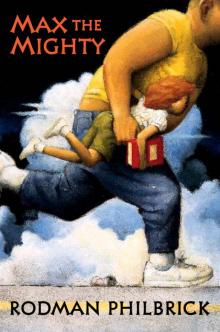 Max the Mighty
Max the Mighty The Last Book in the Universe
The Last Book in the Universe Freak the Mighty
Freak the Mighty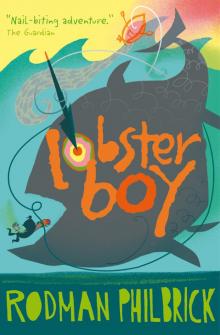 Lobster Boy
Lobster Boy Fire Pony
Fire Pony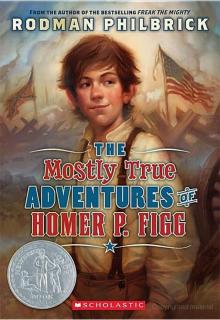 The Mostly True Adventures of Homer P. Figg
The Mostly True Adventures of Homer P. Figg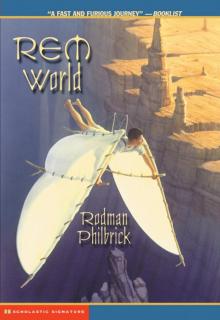 Rem World
Rem World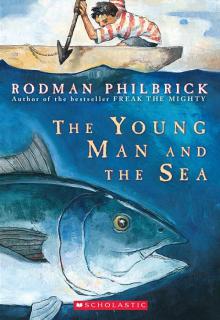 The Young Man and the Sea
The Young Man and the Sea Wildfire
Wildfire Coffins
Coffins The Big Dark
The Big Dark Strange Invaders
Strange Invaders The Fire Pony
The Fire Pony The Haunting
The Haunting Abduction
Abduction Who Killed Darius Drake?
Who Killed Darius Drake? Brain Stealers
Brain Stealers Things
Things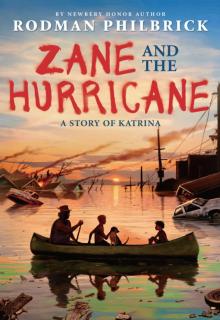 Zane and the Hurricane
Zane and the Hurricane The Final Nightmare
The Final Nightmare The Horror
The Horror Night Creature
Night Creature Children of the Wolf
Children of the Wolf The Wereing
The Wereing